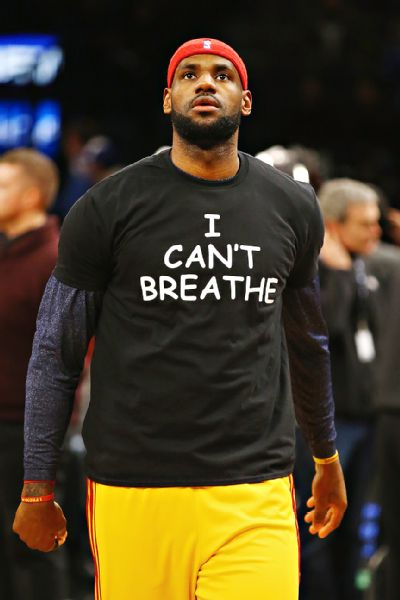Where did that conversation lead?
My dad used the term "n***** woods" referring to the ghettos when we were talking about this without me even bringing up race. It opened me to get him to at least admit that even he sees this as a race issue by using an obviously racial and dehumanizing term in this discussion.
The race talk that resulted was just examples of a couple of times throughout his life where black people got advantages he thinks he didn't get, namely the black guy at work which he thought was nothing special but "got praised" more often than he deserves, and the black guy in the military that was not special but got promoted at the same time he did. The quotas big businesses use to employ the bare minimum of minorities also bothers him.
I can cite and link all the studies of teachers catching more mistakes of black students than white students in their homework dispute the work being exactly the same, or employees calling black people back at the same rate as white felons dispute the resume being exactly the same. I can cite and link all the statistics about how black people are incarcerated at higher rates for drugs despite the higher rate of white people admitting to using drugs, or studies comparing sentencing disparities between similar crimes.
And yet nothing will ever get through. In his mind, the only racism that currently exists in a significant number is racism against whites. He'll always think as long as he doesn't hate all of them and is nice to the good ones, he can't be a racist, and that most people, including those cops are like him. And he is probably right that most people being called racists are looking at race like he is.
It's hard, because they think it's ok to racially profile people inside their heads as long as the final outward judgement isn't racist, and it's ok to dehumanize black people who don't meet their standards as long as they hold them to same standards they hold white people to. I argue the preliminary racial profile inherently changes the standards as it requires more proof and less benefit of the doubt to overcome those standards and thus final resulting judgement is going to be racist at least some the time. And that's where it just loops back to him thinking people's standards are too low when it comes to judging black people.
I just don't know. Most people I talk to about things like this are pretty smart and kind people, but there's just nothing you can do to change their ignorant and hurtful opinions. I guess it's just hard to change anyone's mind about something core to their beliefs.
I mean it's impossible to know where my conversation led after we parted ways. We talked for a while, the bus ride was fairly long. We discussed his experience with injustice in America as a black man, my unique experience in the cultural divide being from a part Jewish/Italian and Puerto Rican family. He apparently got a lot of his views from some book he was reading, I forgot to get the name of it. But I went through the long history of jewish persecution, why there is a perception of Jewish control amongst certain professions, why we should be careful never to view things as black and white even if we do feel there might be some inappropriate cultural preference in places.
I gave him some recommending reading material, and my number if he wanted to talk about anything. Dunno if he ever will call, but it's out there.
Obviously in my life much of my experience has been like yours. Some people believe so deeply in an "emotional truth" that no amount of evidence, no matter how strong, can convince them to move from that position. There's this fantastic article by HULK, about Gamergate, but which applies perfectly to situations like this as well.
Here's a link if you have the time. But I'll quote one relevant bit here:
HULK said:
But beyond that, in any conversation you are also dealing with an emotional truth. It's a thing someone believes is true off the internal feeling they have, or what they want to be true, or what they think must be true for the sake of compassion. The problem with this particular truth is it is both necessary to being a functional person (as it is the thing that allows us to have empathy and kindness in our interactions) and yet also something that is hideously misused. For every ounce of compassion it can well up in us, it also can be used to unfairly denounce actual facts and pervert the truth.
For instance, 9/11 trutherism is a completely inaccurate bit of nonsense, unfounded in every discipline it touches, but it is still propagated by the simple act of someone distrusting government so severely that they place themselves above the fray of being manipulated. That's how powerful emotional truths are. They can take everything we understand about reality and flip it on its head. And often, it's so powerful that many are not aware when they've come to believe something because of their emotional truth. And wouldn't you know it, but the more tenuous the factual claim becomes, the more an emotional truth it becomes.
But the real danger of understanding the emotional truth is it is something that they can use right back against you. With the 9/11 truthers, all your science just becomes truth that you are part of the "sheeple," someone who just wants to pull the wool over their eyes because "the truth" scares them. Which just means that anyone can challenge virtually anything you believe on the same grounds and anything can now fall into disrepute. In this lens, the mainstream media suddenly becomes inept. With gamergate, we're all a bunch of idiots who can have our eyes blinded in our commitment to stopping sexism and loving feminists that we ignore corrupt journalism, etc. Etc... When you don't understand how easy it is to flip the script without holding yourself to factual standards, conversations can get really, really dangerous.
Consider that all the evidence you posted is strong, supported by many studies, poured over by academics and experts of many fields. And yet, the more you show people who believe this about racism toward whites (vs. blacks), the more they refuse to believe. It's all part of some "other" argument that has no place in their emotional truth.
Which can make it especially hard to deal with.
That said, in my time... there have been more than one person I have changed their minds over about racism, and we've become good friends later on. It's rare but it happens. Which is why I always try to approach the subject carefully in real life, because there's always the odd chance someone might listen.






